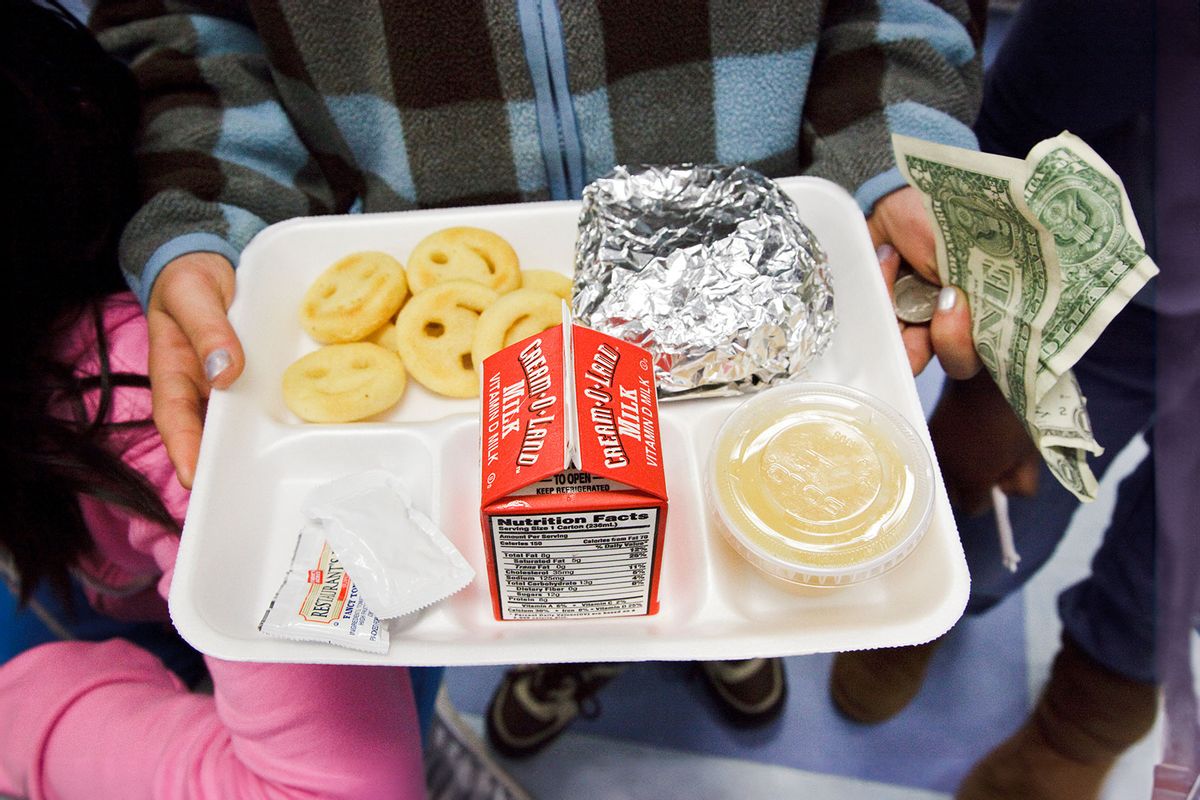Last Wednesday, as Congress faced looming deadlines to pass several major legislative priorities, including a government funding bill, before breaking for the holidays, Republican Congresswoman Virginia Foxx of North Carolina decided to divert attention to the respective difficulty of Santa Claus’ upcoming annual trek. “Hoisting heavy sacks of gifts up and down the chimney is no easy task,” Foxx declared, before suggesting that Santa Claus needs whole milk, as opposed to soy or oat or skim, in order “to travel the whole globe in one night.”
She continued: “We want only the most nutritional option for Santa. Whole milk is the unsung hero of his Christmas journey.”
This dairy-centered diversion wasn’t just a holiday-themed filibuster. For several years now, House Republicans have, with increasing intensity, fought for the reintroduction of whole milk — as opposed to skim or low-fat — to the National School Lunch program as current laws dictate that schools must offer milk that is fat-free or low-fat, and may only offer flavored milk if it is fat-free. This has been the case since 2012 when then-First Lady Michelle Obama moved to only permit low-fat milk variations.
Earlier this year, Rep. Glenn Thompson (R-Pa.) introduced the Whole Milk for Healthy Kids Act, which would reverse those Obama-era requirements, and which was ultimately passed by the House following Foxx’s comments. It now heads to the Senate.
However, running parallel to House Republicans’ desire to reintroduce whole milk to school lunch has been a simultaneous push to prevent plant-based alternatives from being introduced to the cafeteria. To that end, last week the House Rules Committee rejected an amendment proposed by House Democrats from California, South Carolina and Louisiana to offer kids a nutritionally equivalent, plant-based milk option upon request. It’s a decision that is both ironic considering that the Whole Milk for Healthy Kids Act has been touted as a bill aimed at increasing choice for students, as well as one that is racially biased because, as Rep. Troy A. Carter, D-La., put it in a 2022 letter to Agriculture Secretary Tom Vilsack, the rates of lactose intolerance in people of color “are startlingly high.”
“65 percent of Latino students, 75 percent of Black students, and 90 percent of Asian students [are] unable to digest dairy milk without detrimental effects,” Carter wrote.
According to Boston Children’s Hospital, lactase is an enzyme that is normally produced in the small intestine, where it breaks down lactose into a form that can be absorbed by the blood. A lack of lactase, or “lactose intolerance,” can cause uncomfortable symptoms in some people, including nausea, cramps, bloating, gas and diarrhea occurring 30 minutes to two hours — so, not exactly peak physical condition for concentrating in school.
We need your help to stay independent
“This issue hit me hard both as a parent of two Black boys, and as a congressman of a majority-minority district in the south,” Carter told the Washington Post in 2022. “We know our nation’s public schools and health-care systems have deeply flawed histories — and, in some cases, current realities — of inequitable resource distribution and treatment of students and people of color. While this push to offer nondairy, nutritionally equivalent alternatives to our kids there at lunch counters may seem like a small fight, this is another one of those inequities facing communities of color that we can and therefore must take action to fix.”
Though an estimated 30,000,000 to 50,000,000 Americans are lactose intolerant, the condition is least common among individuals with a Northern European heritage — and that “lactose persistence” is something that white nationalists have long clung to as proof of being genetically superior to other races.
This was the case in the early 20th century when milk advertisements, which positioned the drink as a nutritionally “perfect beverage,” would contrast healthy-looking light-skinned models with sickly looking darker-skinned models. As sociologist Melanie DuPuis has written, “By declaring milk perfect, white northern Europeans announced their own perfection.”
Fast-forward to 2017 the hashtag #MilkTwitter went viral after a group of white nationalists descended on an anti-Trump rally following the former president’s inauguration armed with plastic gallons and cartons of milk, from which they would take the occasional swig between hurling racist epithets and touting their own “lactose persistence.”
"While this push to offer nondairy, nutritionally equivalent alternatives to our kids there at lunch counters may seem like a small fight, this is another one of those inequities facing communities of color."
“An ice-cold glass of pure racism,” one attendee remarked to the camera after taking a drink from his carton. Let’s just say that it’s not a coincidence that milk makes an appearance in both “Inglourious Basterds” and “Get Out,” consumed, respectively, by a Nazi and a racist bodysnatcher.
Does this line of thinking qualify the Whole Milk for Healthy Kids Act as white nationalist propaganda? Of course not. However, it’s important context to consider when politicians declare whole dairy milk the perfect beverage because it raises the question: Perfect for whom? Currently, according to 2022 numbers from the USDA, 29% of the cartons of dairy milk served in American public schools are thrown in the garbage — unopened.
In speaking with the Washington Post last year, Rep. Carter said that continuing to force dairy on children who physically can’t consume it is unconscionable.
“For many of these kids, school meals may be the only food available to them that day,” he said. Children cannot learn if they feel sick or hungry, and yet we know that millions of children, especially children of color, experience negative symptoms after ingesting the dairy that our current school lunch program requires be placed on every student’s lunch tray.”



Shares